| Listing 1 - 10 of 26 | << page >> |
Sort by
|
Article
Abstract | Keywords | Export | Availability | Bookmark
 Loading...
Loading...Choose an application
- Reference Manager
- EndNote
- RefWorks (Direct export to RefWorks)
Book
ISBN: 2351590082 Year: 2005 Publisher: Paris Geuthner
Abstract | Keywords | Export | Availability | Bookmark
 Loading...
Loading...Choose an application
- Reference Manager
- EndNote
- RefWorks (Direct export to RefWorks)
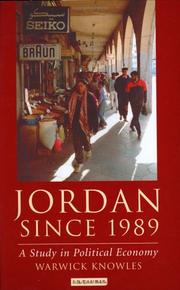
ISBN: 1850436339 9781850436331 Year: 2005 Publisher: London ; New York : New York : I.B. Tauris ; Distributed by Palgrave Macmillan in the United States and Canada,
Abstract | Keywords | Export | Availability | Bookmark
 Loading...
Loading...Choose an application
- Reference Manager
- EndNote
- RefWorks (Direct export to RefWorks)
This is the first major work in political economy to study the impact of the 1989 IMF intervention and the changes that it has wrought upon the Jordanian economy. Knowles argues that the blurring of boundaries between the public and private sector has significantly affected the success of IMF and World Bank policies in Jordan which are predicated upon a clear distinction between these sectors. Furthermore Jordan's move from an economy that is dependent upon outside economic assistance to one that is dependent upon remittances has affected the power of the country's elite which hitherto depended on access to and control of aid.
Jordan --- Jordan --- Jordan --- Economic policy. --- Foreign economic relations. --- Politics and government.
Periodical
ISSN: 23086149 Year: 2005 Publisher: ʻAmmān, al-Urdun : al-Lajnah al-ʻUlyā lil-Baḥth al-ʻIlmī, Wizārat al-Taʻlīm al-ʻĀlī wa-al-Baḥth al-ʻIlmī, wa-al-Jāmiʻah al-Urdunīyah,
Abstract | Keywords | Export | Availability | Bookmark
 Loading...
Loading...Choose an application
- Reference Manager
- EndNote
- RefWorks (Direct export to RefWorks)
Public administration --- Industrial management --- Jordan --- Jordan. --- Politics and government --- Economic policy
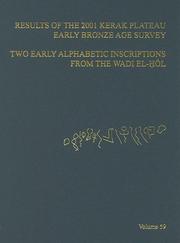
ISBN: 9780897570718 0897570715 Year: 2005 Publisher: Boston, MA: American schools of Oriental research,
Abstract | Keywords | Export | Availability | Bookmark
 Loading...
Loading...Choose an application
- Reference Manager
- EndNote
- RefWorks (Direct export to RefWorks)
Excavations (Archaeology) --- Bronze age --- Alphabet --- Kerak Plateau (Jordan) --- Inscriptions
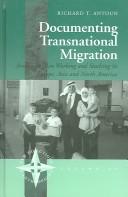
ISBN: 184545037X 9781845450373 Year: 2005 Publisher: New York: Berghahn Books,
Abstract | Keywords | Export | Availability | Bookmark
 Loading...
Loading...Choose an application
- Reference Manager
- EndNote
- RefWorks (Direct export to RefWorks)
Foreign workers, Jordanian --- Jordanian students --- Jordan --- Emigration and immigration.
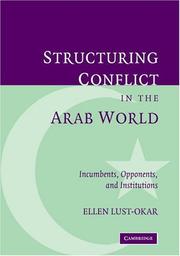
ISBN: 0521838185 Year: 2005 Publisher: Cambridge ; New York Cambridge University Press
Abstract | Keywords | Export | Availability | Bookmark
 Loading...
Loading...Choose an application
- Reference Manager
- EndNote
- RefWorks (Direct export to RefWorks)
This book examines how ruling elites manage and manipulate their political opposition in the Middle East. In contrast to discussions of government-opposition relations that focus on how rulers either punish or co-opt opponents, this book focuses on the effect of institutional rules governing the opposition. It argues rules determining who is and is not allowed to participate in the formal political arena affect not only the relationships between opponents and the state, but also between various opposition groups. This affects the dynamics of opposition during prolonged economic crises. It also affects the informal strategies that ruling elites use toward opponents. The argument is presented using a formal model of government-opposition relations. It is demonstrated in the cases of Egypt under Presidents Nasr and Sadat, Jordan under King Husayn and Morocco under King Hasan II.
Opposition (Political science) --- Arab countries --- Case studies --- Elite (Social sciences) --- Political participation --- Politics and government --- Egypt --- 1970 --- -Jordan --- 1952-1999 --- Morocco --- 1961 --- -Elite (Social sciences) --- Jordan
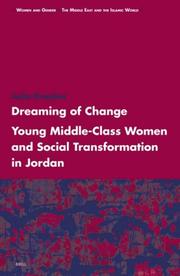
ISBN: 9789047416067 9789004146341 Year: 2005 Publisher: Leiden; Boston : BRILL
Abstract | Keywords | Export | Availability | Bookmark
 Loading...
Loading...Choose an application
- Reference Manager
- EndNote
- RefWorks (Direct export to RefWorks)
This anthropological monograph focuses on the everyday experiences of young, highly educated women in contemporary Jordan. It carefully analyses their powerful contributions to social change as well as the strategies they employ in dealing with the problems they generally face. In their struggle to find recognition, religion (Islam and Christianity) often plays a major part and helps them to empower themselves, which is also reflected in this account. The study discusses family relationships, social networks, gender constructions, religiousness, and women's roles in various social spheres. It sheds light on how these young women actively influence transformations in their society and re-negotiate their own and other people's social position, and how they, in turn, are highly influenced (and often restricted) by the socio-cultural environment in their efforts towards change.
Middle class women --- Sex role --- Social change --- Women and religion --- Women --- Women --- Young women --- Jordan --- Social conditions --- Social conditions --- Jordan --- Social conditions

ISBN: 0791483320 1423744152 9781423744153 0791464458 9780791464458 9780791483329 Year: 2005 Publisher: Albany : State University of New York Press,
Abstract | Keywords | Export | Availability | Bookmark
 Loading...
Loading...Choose an application
- Reference Manager
- EndNote
- RefWorks (Direct export to RefWorks)
Explains how the Jordanian monarchy has survived economic crisis and regional political instability.
Structural adjustment (Economic policy) --- Political culture --- Economic policy --- Culture --- Political science --- Jordan --- Politics and government
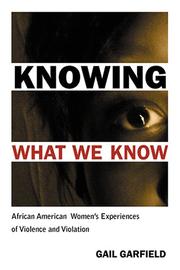
ISBN: 0813537592 0813536596 081353660X 9780813537597 9780813536590 9780813536606 0813580455 9780813580456 Year: 2005 Publisher: New Brunswick, NJ
Abstract | Keywords | Export | Availability | Bookmark
 Loading...
Loading...Choose an application
- Reference Manager
- EndNote
- RefWorks (Direct export to RefWorks)
In recent years there has been an attempt by activists, service providers, and feminists to think about violence against women in more inclusive ways. In Knowing What We Know, activist and sociologist Gail Garfield argues that this effort has not gone far enough and that in order to understand violence, we must take the lived experiences of African American women seriously. Doing so, she cautions, goes far beyond simply adding voices of black women to existing academic and activist discourses, but rather, requires a radical shift in our knowledge of these women’s lives and the rhetoric used to describe them. Bringing together a series of life-history interviews with nine women, this unique study urges a departure from established approaches that position women as victims of exclusively male violence. Instead, Garfield explores what happens when women’s ability to make decisions and act upon those choices comes into conflict with cultural and social constraints. Chapters explore how women experience racialized or class-based violence, how these forms of violence are related to gendered violence, and what these violations mean to a woman’s sense of identity. By showing how women maintain, sustain, and in some instances regain their sense of human worth as a result of their experiences of violation, Garfield complicates the existing dialogue on violence against women in new and important ways.
African American women --- Violence against. --- Crimes against. --- Afro-American women --- Women, African American --- Women, Negro --- Women --- Interviews. --- Jordan, Barbara, --- Conversation --- Interviewing --- Jordan, Barbara Charline, --- African Americans --- Intellectual life. --- United States --- Civilization --- African American influences. --- African American intellectuals
| Listing 1 - 10 of 26 | << page >> |
Sort by
|

 Search
Search Feedback
Feedback About UniCat
About UniCat  Help
Help News
News